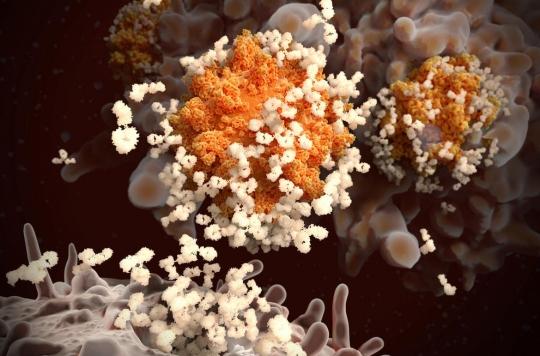The immune response triggered by vaccines from Pfizer and Moderna would be able to fight off the virus years after inoculation.

- These results call into question the possible need for booster vaccines, however following the evolution of the variants.
- The germinal center, a specialized structure that forms in the lymph nodes during infections or vaccinations, remains active over time.
- According to the study authors, the immunity could last for years or even a lifetime.
How long does vaccine immunity to Covid-19 last? It is currently impossible to answer this question with certainty, for lack of hindsight. However, a recent study, published on June 28 in the journal Nature, suggests that the messenger RNA vaccines, the Pfizer and Moderna, trigger an immune system response that could ward off the coronavirus for several years. The researchers, who only studied mRNA vaccines, speculate that the Johnson & Johnson vaccine produces a less durable immune response.
The germinal center remains active for several weeks
These results call into question the possible need for vaccine boosters in the face of the evolution of variants. “This is a good sign of the durability of our immunity”, rejoices Ali Ellebedy, immunologist at Washington University in St. Louis and lead author of the study, interviewed by the New York Times. In previous research, Ali Ellebedy and his colleagues found that natural immunity, acquired after infection, persists in the bone marrow for at least eight months after infection. Another study estimated that memory B cells continue to mature and strengthen for at least a year after infection.
The scientists focused their research on observing a specialized structure called the germinal center that forms in the lymph nodes during infections or vaccinations. This structure is where B cells are driven. This germinal center is formed differently depending on whether immunity is formed after an infection or vaccination: after contamination, it appears in the lungs whereas after vaccination it is established in the lymph nodes of the armpits.
The vaccine reminders in question
For the study, the team of researchers recruited 41 people who received two doses of the Pfizer-BioNTech vaccine. They took lymph node samples at three, four, five, seven and 15 weeks after the first dose in 14 of them. They found that the germinal center remains active and the number of memory cells that recognize the coronavirus has not dropped. “The fact that the reactions continued for almost four months after vaccination is a very, very good sign.”, assures Ali Ellebedy. In normal times, the terminal centers usually peak one to two weeks after vaccination before decreasing.
According to the study authors, the immunity could last for years or even a lifetime. The question of the need for booster injections arises, underline the researchers. However, the elderly and those with weakened immune systems might need boosters, they note.

.














